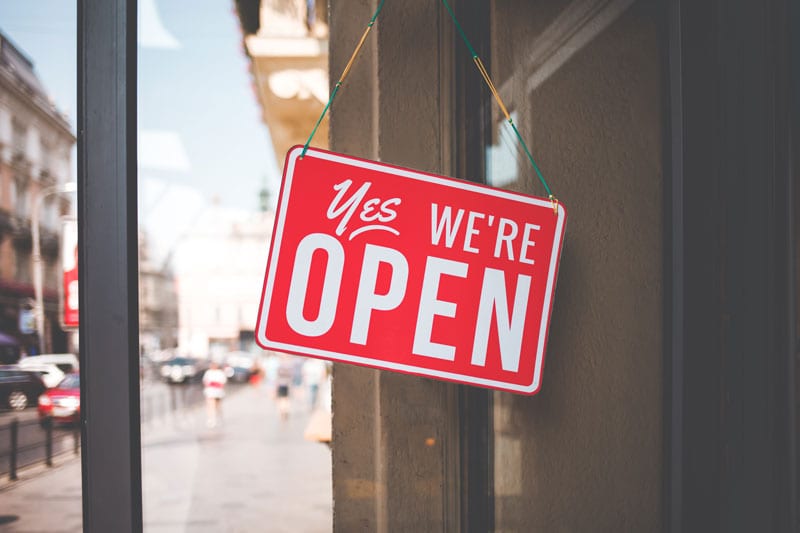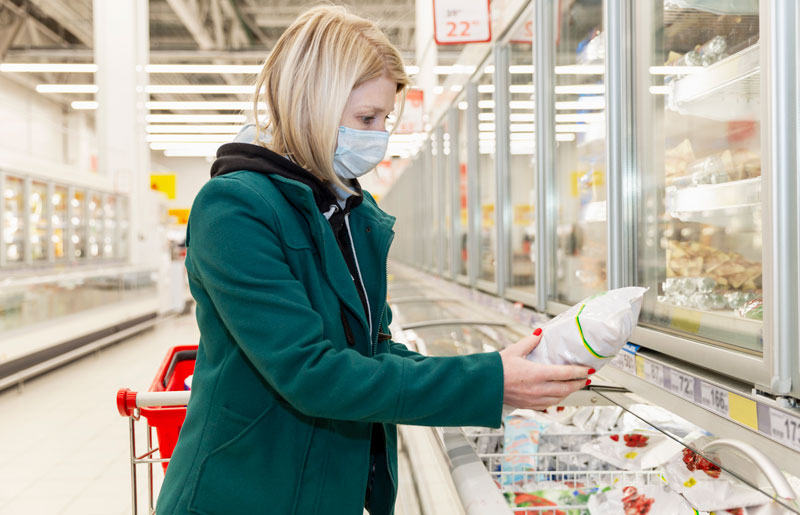Cancer in the Age of Coronavirus
Having cancer, being in remission or having a loved one with cancer can be stressful even under ideal conditions. And 2020 certainly hasn’t been ideal.
We want to share some encouragement and suggestions that can help alleviate some of that anxiety. Please keep in mind that the spread and treatment of COVID-19 continues to evolve, so recommendations included in this article could potentially change. We are also available to answer your questions or address your concerns.
The Open Door
 As more places start allowing in-person shopping or dining, it’s important to remember that you don’t have to walk through every open door. As someone with a compromised immune system, it’s wise to evaluate the risk associated with each place you visit outside of your home. It’s also a good idea for your primary caregivers to be mindful of their interactions with others. Key recommendations include:
As more places start allowing in-person shopping or dining, it’s important to remember that you don’t have to walk through every open door. As someone with a compromised immune system, it’s wise to evaluate the risk associated with each place you visit outside of your home. It’s also a good idea for your primary caregivers to be mindful of their interactions with others. Key recommendations include:
- Focus on facts. The internet is a double-edged sword. It can be a powerful source of information and a way to stay connected with loved ones during times of social distancing. But it’s also easy to get swept up in memes or emotionally-charged conversations that can potentially endanger your health. Because this virus is so new (hence, the name Novel Coronavirus), information changes rapidly.
Things that were once thought to be facts may ultimately be determined to be incorrect. This isn’t due to bad intentions, but occurs because of the steep learning curve associated with COVID-19. Some people have described this experience as trying to build an airplane while already in the air.
For example, in the early stage of the pandemic, people were advised to wipe down their groceries or keep non-perishable items in their car for three days before putting them away. The FDA now says that this is probably not necessary, but you should still wash your hands thoroughly after putting groceries away, and wipe down cabinet and refrigerator handles.
- Consider the source. When looking for statistics and advice, choose legitimate, science-based organizations such as:
- Beware of myths. While some things may sound reliable or come from a seemingly-credible source, there is a great deal of inaccurate information swirling about. While some of these myths are relatively benign (like the incorrect statement that COVID-19 is spread by houseflies) others are inherently dangerous (such as the comment that drinking ethanol, methanol or bleach will kill the virus).
 Here’s the truth about several common myths – you can find more facts on the WHO website:
Here’s the truth about several common myths – you can find more facts on the WHO website:
- FACT: Coronavirus disease cannot be cured with antibiotics. Antibiotics do not work against viruses – they only work against bacteria. Some people who become ill with COVID-19 may develop a bacterial infection as a complication. If that occurs, THEN antibiotics may be recommended by a healthcare provider for the secondary infection.
- FACT: Adding hot peppers to your soup or other meals DOES NOT prevent or cure COVID-19. Unfortunately, it’s as simple as that.
- FACT: Thermal scanners CANNOT detect COVID-19. They are effective in detecting people who have a fever, but cannot identify people who are infected with COVID-19.
- FACT: Most people who get COVID-19 have mild or moderate symptoms and can recover with supportive care. If you have a cough, fever and difficulty breathing seek medical care early – call your healthcare provider by phone first. If you are experiencing severe or emergency symptoms, call 911.
- FACT: The prolonged use of medical masks* when properly worn, DOES NOT cause CO2 intoxication nor oxygen deficiency. Sure, wearing them can be uncomfortable, but it doesn’t lead to CO2 intoxication nor oxygen deficiency. Make sure your mask fits properly, don’t re-use a disposable mask and change it as soon as it gets damp. *Medical masks (also known as surgical masks) are flat or pleated; they are affixed to the head with straps or have ear loops.
- FACT: 5G mobile networks DO NOT spread COVID-19. Viruses cannot travel on radio waves/mobile networks. The coronavirus is spread through respiratory droplets when an infected person coughs, sneezes, speaks or sings. It can also be transmitted by touching a contaminated surface and then touching your eyes, mouth or nose.
Choose Wisely
The ongoing COVID-19 crisis has had a negative impact on the mental health of many people. Medical experts agree that feeling isolated and overwhelmed by negative news can increase depression, anxiety and mis-use of drugs or alcohol. That’s why it’s important to find ways to connect and feel some sense of normalcy without putting your health – or your caregiver’s health – at risk.
- Let’s start with ideas for safer visits with friends and family:
- Find out if they’ve recently been on vacation or have attended a large event. If so, you should continue communicating using video chat until they’ve quarantined themselves for 14 days.
- Ask everyone to check their temperature before getting together. Anyone who has a temperature over 100.4 degrees Fahrenheit shouldn’t be a physical part of the gathering (but they can participate via video).
- Meet outside, wearing masks and arrange seating to be six feet apart. While some may consider this to be excessive, it’s wise for cancer patients and their loved ones to be extra cautious.
- If you’re hosting the get-together, designate one bathroom for all guests.
- Remove any personal items (razors, toothbrushes, etc.) that may be sitting out.
- Replace hand towels with paper towels.
- Leave a canister of cleaning wipes on the counter to encourage guests to wipe the door and toilet handles, faucet, counters and other high-touch surfaces.
- Ask your spouse, grown child or other family member to clean the bathroom after everyone leaves. (If there isn’t anyone who can do that for you, avoid that bathroom for three days and clean it after the virus has had time to degrade on the surfaces.)
- Wipe down all door handles (inside and outside), light switches, lawn chairs or other objects that people may have sneezed on or touched
- When venturing out to the store, church or a restaurant, we suggest the following:
- Wear a mask and practice good hand hygiene. (Wash your hands for at least 20 seconds before and after any interactions; if soap and water aren’t available use hand sanitizer with at least 60% alcohol.)
- Find out if the facility you’re visiting is adhering to re-opening guidelines provided by the Occupational Safety and Health Administration (OSHA).
- Avoid peak times at stores, salons and spas. Follow proper safety precautions while there.
- When possible, choose outside instead of inside. If you want to go for a walk, choose a park or woodsy path, rather than taking laps at the mall or gym.
- Steer clear of places where employees or patrons aren’t wearing masks or maintaining social distancing.
Critical Healthcare Decisions
During the pandemic, a large number of people haven’t been able to undergo normal health screenings and check-ups, which puts you at risk for delaying potentially needed treatment.
As a cancer patient, you still need to maintain contact with your medical providers. This can take on the form of a virtual visit, a phone call or even a message through your provider’s online portal. At Illinois CancerCare, we don’t want you to hesitate to reach out to us with any questions, concerns or routine needs. Staying in touch is crucial to your short-term and long-term health.
In terms of dental check-ups and treatment, we recommend that you contact your Illinois CancerCare nurse practitioner to determine if it’s safe and appropriate for you to visit the dentist. We can talk through the various options and ways to make your dental visit safer.
Our thoughts continue to be with you and your caregiver during this challenging time. Please stay safe, healthy and happy!



